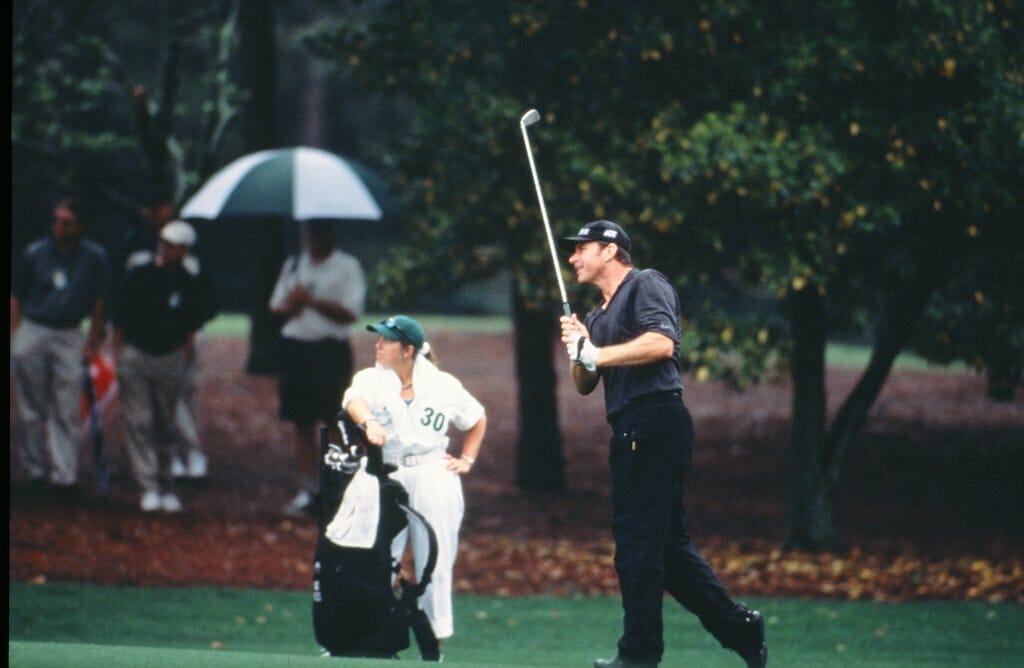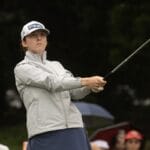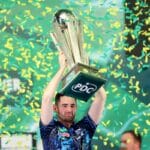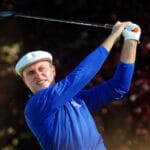Masters Tournament, April 8-11, 1971. A hugely significant event in golf history but not for the obvious reason of the on-course drama.
We’re not talking about Charles Coody winning the Green Jacket after being chased home by Johnny Miller and Jack Nicklaus who finished tied for second place. No, we’re out there in television land at a time when Masters coverage on this side of the Atlantic was limited to a 50-minute highlights package on BBC 2 shown on the Monday following the tournament’s final round.
Compared with the wall-to-wall exposure of professional golf in general and The Masters in particular which we enjoy nowadays, this was a paltry offering, but one appreciated by golf fans in Ireland and the UK.
So what? Well, by pure coincidence, or maybe it was fate, and thanks to the novelty of colour television, a young English lad named Nick Faldo first saw Augusta National presented to the world in all its glory that weekend 50 years ago. Not that 13-year old Faldo knew or cared much about that beforehand.
He had never seen golf played before. He had no interest in the game. An only child of strict but supportive and loving parents George and Joyce, the lad from Welwyn Garden City in Hertfordshire had always been permitted to follow through on his ever-changing passions, from swimming, athletics, music, to outdoor activities such as canoeing.
So there he was, on Easter Monday, 1971, sat watching television when The Masters highlights flared onto the screen. Young master Faldo, as the late, great Peter Alliss might have called him, had his interest royally piqued by Jack Nicklaus. Something about the way the Golden Bear carried himself, the roars he generated among the galleries, the flashing blond locks and the intensity with which he played stirred a kernel of ambition in Faldo. He watched, entranced, with eyes only for Nicklaus till the broadcast ended.
Next morning, he bounced down the stairs to breakfast and told his parents he wanted to play golf. Mum’s response? Low key indeed. “Well, you’ll need to get your hair cut.” And she did it herself before taking her offspring to the pro shop at Welwyn Garden City Golf Club and paying for a six-lesson package. Therein lay the fledgling beginning of what was to evolve into a success-laden career.
Where does the time go? The boy of 1971 is now a 63-year old grandfather who is lead golf analyst for CBS and a keen observer of the current generation of stars who crave a Green Jacket. Whatever he thinks and says about them, and whether they like it or not, the old geezer can look any of them in the eye – bar, of course, Tiger Woods – and say: “here’s my medals, where’s yours?” and know they must bow the knee.
Faldo can rest secure on his golfing laurels. Since the European Tour began in 1972, he reigns supreme as Europe’s most successful Major winner with three Open Championships, and three Masters victories plus a stunning Ryder Cup record and a host of tournament wins on his golfing CV.
A ferocious competitor in his day, he was back in the news recently after poking at the under-achieving Rickie Fowler (my words, not his). Fowler’s commercial activities are flowing but his golf has not been at the level the player and observers such as Faldo might expect. Hence a tweet from the Brit about Rickie early in March when the latter looked like missing The Masters: “Good news is if he misses the Masters he can shoot another six commercials that week!”
Ouch! In fairness, Faldo later said his motivation was to try and wind-up Fowler as a motivation technique, and the American golfer said he took it in that spirit. Hmm. I wonder was Fowler as forgiving in private as he was in public? He was only the latest one to fall victim to Faldo’s dry sense of humour, so dry it can be likened to a parched desert.
Faldo sparked fury from the British tabloids when, at his speech following the 1992 Open Championship win at Muirfield, he said he thanked the fans from the bottom of his heart, and the media from the heart of his bottom. He thought he was being funny, and ironic. It didn’t go down that way. Cue a torrent of negativity from the tabloids, who dished out plenty of stick to the golfer during his career.
For example, the Daily Mail in 2000 ran a photo of Faldo and a headline saying “Is This The Most Hated Man in British Sport?” Previously, another tabloid’s headline roared: “Foldo” when for once the iron man had failed to lock down a victory. Serial killers have received more gentle treatment from newspapers than that.
I’m not saying that Faldo was an easy guy to be around, particularly for the media, but his job inside the ropes was to ply his trade to the best of his ability, something he did better than most of his peers.
Off the golf course, he has, over the years, hit the headlines for his romantic trials and tribulations. Currently he is getting set to marry for the fourth time – a triumph of hope over experience some might say. He also displayed a great ability to put his foot in it, especially during the opening ceremony of the 2008 Ryder Cup.
It was hard to decide whether to wince in embarrassment for him or get mad at his ignorance when he said of Padraig Harrington that he had “hit more balls than potatoes had been planted in Ireland”, and then looked over at Portrush native Graeme McDowell and asked if he had been born in “Ireland or Northern Ireland”. Soren Hansen was introduced as Soren Stenson, and most of the speech was devoted to a eulogy about his family members. And, of course, he proved to be a rubbish Ryder Cup captain.
As a player, Faldo was at his best when grinding his way through the field, oblivious to anything outside his immediate focus.
Ireland proved a happy hunting ground, with his hat-trick of Irish Open titles a career highlight – Killarney in 1991 and ’92, and Mount Juliet in 1993. It’s a sobering thought that twenty-five years have passed since Faldo annexed his sixth Major title in that unforgettable 1996 Masters when he remorselessly hunted down Greg Norman through the last 18 holes.
In that time, as the Englishman’s golfing powers gradually waned before television, course design and other business interests delivered a second career, no European has knocked Faldo off his perch in terms of Major wins.
The late Seve Ballesteros got to five majors and Rory McIlroy, a former protegé of Sir Nick who was knighted in 2009 for services to golf, has an impressive haul of four. That said, seven years, so far, without a fifth for Rory illustrates that capturing the game’s elite trophies is extremely difficult, and rightly so because this is immortality and it should never come cheaply or easily.
Could McIlroy match or beat Faldo’s record? At only 31 – he turns 32 on May 4 – of course it’s possible. How likely is it? Mentally, Rory could do with a huge dollop of Faldo’s unrelenting mental focus on the biggest occasions, particularly at Augusta.
His former mentor has also spoken about a need for the Northern Irishman to improve his distance control with short irons and also call on more resilience when a shot or two goes astray. Pete Cowen, who has signed on to Team Rory, could sort McIlroy out, possibly sooner than later, but he still has a long way to go to match Sir Nick’s achievements.
























Leave a comment